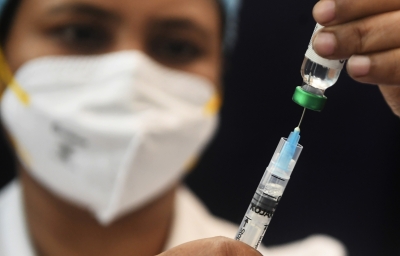Daily Wage Worker Platform and Jindal Global University release a survey report on vaccine adoption and resistance among migrant workers
By IANS | Published: November 22, 2021 01:18 PM2021-11-22T13:18:06+5:302021-11-22T13:25:16+5:30
New Delhi, Nov 22 The Covid-19 vaccine has begun to mitigate the devastating effects of the pandemic. The ...

Daily Wage Worker Platform and Jindal Global University release a survey report on vaccine adoption and resistance among migrant workers
New Delhi, Nov 22 The Covid-19 vaccine has begun to mitigate the devastating effects of the pandemic. The government launched its mass inoculation campaign in January 2021 and as of 10 November 2021, more than 110 crore Indian citizens have received at least one dose. There exists multiple roadblocks on the way to a 100 per cent vaccinated India, the most prominent being vaccine hesitancy and resistance amongst the vulnerable population. Vaccine hesitancy refers to the delay in acceptance of a vaccine, while resistance indicates an outright rejection.
To measure the level and characteristics of resistance in the hesitant population, The Daily Wage Worker Platform (DWWP) in association with Jindal Global University (JGU) conducted a survey to measure vaccine adoption and resistance in urban India. Together, the two organisations announce the release of a report analysing the major findings from the survey. JGU is India's top private university with a diverse faculty of national and global researchers and academics. Sriram Raghavan, Joint Director at Jindal Global University said, "We are thrilled to have associated with DWWP to develop a knowledge platform to support migrant and daily wage workers in India. The voluntary program with the NGO has been an enriching experience for our students as they witnessed the daily struggles of migrant workers. We are grateful for the academic and field exposure that the students attained while working on this important report that brings to light a critical perspective of India's 450 million informal sector workers on the country's vaccination drive".
Daily Wage Worker Platform (DWWP) is an NGO dedicated to supporting migrants and daily wagers throughout the pandemic with food security, healthcare and livelihoods. During the first wave, DWWP partnered with the Swiss government and Smile Foundation to roll out an emergency health package for workers in slums using Tele-medicine and social distancing. DWWP set up a virtual help desk to provide up to date information on the availability of medical supplies during the second wave. "Our vaccine survey report provides a field assessment of the reach of the national vaccination program amongst urban migrants, as well as insights into the factors that are causing resistance and hesitancy among workers. We hope the findings and recommendations are incorporated into the design of national communications and vaccination programs to overcome vaccine resistance globally", said Siddhartha Prakash, Founder, Daily Wage Worker Platform.
The dipstick survey was conducted by researchers from JGU across six cities - Delhi, Gurgaon, Mumbai, Ranchi, Chennai and Kolkata. The team initially hypothesised the causes and characteristics of vaccine hesitancy/resistance using secondary research. The survey was then meticulously designed to measure various demographic and psycho-social aspects. 200 migrants and daily wage workers were surveyed using the method of convenience sampling by the team. The report analyses their responses and attempts to provide suggestions for key stakeholders - the government, NGOs and corporations. Results of the vaccine survey revealed that, of the 200 migrants surveyed across six cities, 44 per cent received the first dose, 18 per cent received the second dose, 38 per cent had not been vaccinated, 18 per cent were hesitant and 12 per cent refused to take the vaccine.
The survey measured hesitancy and resistance towards the vaccine against several parameters including age, gender, occupation, and so on. Of these, income stood out; demonstrating an inverse relationship between annual income levels and hesitancy to the vaccine. Daily wage workers earning less than Rs 10,000 per month were most resistant to vaccination. On the other hand, migrants with a fixed income were willing and semi-vaccinated. Many public and private sector employers are actively facilitating the vaccination process, including construction companies and railways, who have made it mandatory for their workers to be vaccinated.
However, many workers remain ignorant, suspicious and resistant to the Covid-19 vaccine. Along with assessing hesitancy levels among various groups, the survey also sought to uncover the underlying causes and beliefs that resulted in hesitancy. These included reasons such as fear of side effects, loss of wages, distrust in the public health system and lack of information and access to the vaccination program. One major factor that seemed to influence hesitancy levels was channels of communication, with respondents who received most of their information from community leaders or panchayats reporting greater hesitancy to the vaccine.
The recommendations section provides implementable ways to reduce vaccine hesitancy based on the survey findings. Recommendations for the government include the need to provide information, build trust among communities and make the vaccine more easily accessible. NGOs can play an important role in mobilizing communities, dispelling myths about vaccines and facilitating access to the Aarogya Setu App and vaccine centres. Employers can continue to play an important role in incentivizing workers to get vaccinated by making it mandatory and facilitating access.
Disclaimer: This post has been auto-published from an agency feed without any modifications to the text and has not been reviewed by an editor
Open in app